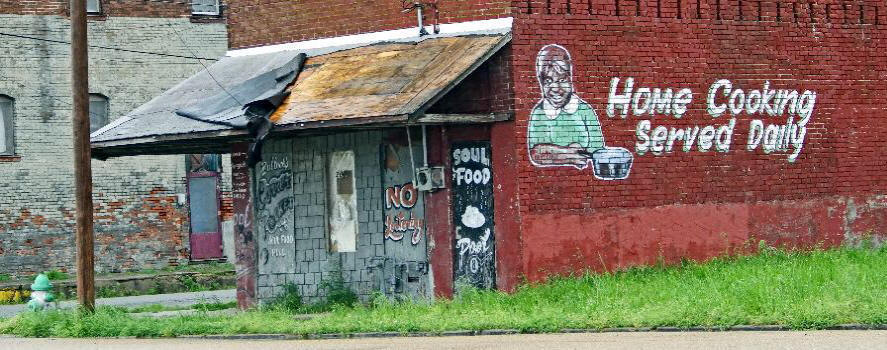
~ Delta Poetry Review ~
Feed and Seed
Perhaps not one of us can go home
again, but who would want to?
A scarf of rainclouds had wrapped
around the mountains as we drove
to the quiet town, and now we jogged
to the two-story red brick building
on the corner of the quaint main street,
aiming for the dark green and cream
striped awnings shielding the door
from the glistening droplets as the last
light drained from the sky. The long
time-weathered sign, barely legible,
read “Fletcher Supply Co.” and was
bookended by vintage Coca-Cola discs
the size of table tops. An historic plaque
mentioned these bricks were stacked in
1919; the same year my grandfather
first awoke to the world. The difference
being this building was still standing.
Inside, elderly couples shuffled to
bluegrass music: the fiddle piercing,
the banjo frenetic, the mandolin like
swollen drops of rainwater pattering
on shale. I couldn’t escape the
sensation—who would want to?—
of her hands in mine as she taught me
to freestyle clog. I didn’t know my heel
from a horseradish, but we stomped on
those creaky wooden floors till sweat
soaked through our shirts, someone
whistling when I spun her. When we
paused for breath, an older man,
hunched and mustached, leaned over
and said, “bluegrass on Fridays and
Saturdays, church on Sundays!” Well,
that explained the pews, and how
places don’t seem to have meaning
until people bestow it. At times,
we may need to pray; at others, we
need to dance. What are our bodies
supposed to do with space, with
themselves? We whirled the night
away until the band closed out their
set with Hank’s classic gospel hymn.
Standing by the front pew, the whole
room singing 'I’ll fly away oh glory,'
we let our shoulders lean and touch,
my eyes pressed shut, my lungs belting
out the tune with all their might,
feeling as if some unsayable place
within me had already taken flight.
Thirty-Three
Football Fields
So much can happen in a city, in a day,
especially when it’s untethered and jubilant
New Orleans, and it’s an afternoon in 1925.
Faulkner and Spratling have just finished
fabricating history and gossip while posing
as guides for a walking tour, and are now
back in their apartment, shooting passerby
with BB guns through the wrought-iron
balcony—extra points for nuns—laughing
as they stir up juniper gin in the bathtub.
So much can happen in a street, in an hour,
Katrina’s wailing vortex moved off
elsewhere, dissipating, as the macabre
sight of coffins floating down Canal Blvd
silences the saxophones, a reminder
the dead are always with us. The museum
placard says coastal wetlands are vanishing
at a rate of thirty-three football fields a day:
a hundred yards of land lost for every year
of Christ’s life, or Crane’s, nearly, lost at sea
until the day is yesterday or tomorrow or a
distant decade obscured from view by the
stone-grey clouds. So much can happen
in a swamp, in a second. An alligator
languishes, a mosquito scribbles in
the humid air, a mottled bald cypress
watches the other trees as they quiver.
Ben Groner III, recipient of Texas A&M University’s 2014 Gordone Award for undergraduate poetry and a Pushcart Prize nomination, has work published in Cheat River Review, Whale Road Review, Appalachian Heritage, Still: The Journal, Louisiana Literature, and elsewhere. He’s also a bookseller at Parnassus Books. You can see more of his work at bengroner.com/creative-writing/
| Archive | Submissions | About |